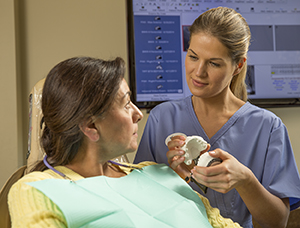Understanding Temporomandibular Disorders (TMD)
Do you have pain in your face, jaw, or teeth? Do you have trouble chewing? Does your jaw make clicking or popping noises? These symptoms can be caused by temporomandibular disorders (TMD). This term describes a group of problems related to the temporomandibular joint (TMJ) and nearby muscles. The TMJ is the joint that opens and closes your mouth. Your symptoms may be painful and frustrating. But don’t worry. Your healthcare team can help you treat TMD and prevent future problems.

What’s wrong?
TMD causes many kinds of symptoms. That’s part of the reason it can be hard to diagnose. Your pain may be constant. Or it may come and go without any apparent reason. TMD symptoms may include:
Experts aren't always sure what causes TMD-related problems. It may be a combination of genes, stress, and how a person experiences pain. Other causes may include:
-
Injury to the jaw or face
-
-
Muscle inflammation
-
Joint damage from arthritis or dislocation
-
Teeth grinding or clenching
What can you do?
If you are having TMD symptoms, don’t wait. Call your dentist or healthcare provider right away. You don’t have to live with pain or discomfort. TMD can be treated. In fact, a key part of treatment is learning to manage your condition at home.
Which treatment is right for you?
Treatment helps rest the muscles and joint. It also helps relieve symptoms and restore function. Depending on the type of problem you have, your treatment plan may include:
-
Short-term (temporary) diet changes, such as eating soft foods
-
New habits for managing stress and maintaining the health of your jaw
-
Medicine to reduce pain and inflammation
-
Physical therapy exercises to reduce pressure on the joint and restore function
-
Mouth guard or bite plate
-
Dental treatment to reduce pressure on the joint
How can you prevent future problems?
Treatment can help relieve your current condition. But TMD symptoms may return over time. You may prevent future problems by maintaining the health of your jaw:
-
Stay away from foods and habits (chewing gum or nail biting) that make your symptoms worse.
-
Lower the stress level in your life.
-
Follow your treatment plan.
-
Pay attention to your body and get help if symptoms return.
Online Medical Reviewer:
Jessica Gotwals RN BSN MPH
Online Medical Reviewer:
Michael Kapner MD
Online Medical Reviewer:
Tennille Dozier RN BSN RDMS
Date Last Reviewed:
9/1/2022
© 2000-2024 The StayWell Company, LLC. All rights reserved. This information is not intended as a substitute for professional medical care. Always follow your healthcare professional's instructions.